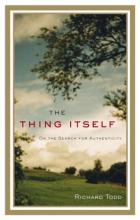The Thing Itself: On the Search for Authenticity
 |
By Richard Todd ’62. New York City: Riverhead Press, 2008. 253 pp. $24.95 hardcover.
Reviewed by William H. Pritchard ’53
Exerting their grip
Over the years, Richard Todd has done many things and done them well: magazine editor and reviewer (The Atlantic, New England Monthly) who later had his own imprint at Houghton-Mifflin; world traveler and travel writer; and, more humbly, service as a staff member in a sometime English course at the fairest college. But The Thing Itself is his first book, and as usual, Todd does not disappoint. He has taken as his subject nothing less than a nearly impossible one. How do you write about “The Search for Authenticity” without producing either theoretical big talk or cultural bromides? No one will read this book and not think at one point or another of Thoreau, and Todd reminds us that “Thoreau was always more complicated than the aphorisms we mine him for.” This could be said about Todd’s writing as well; more specifically, about the way his sentences continually resist the banal—the homely-complacent feel of things with which an inferior writer might be content. Todd always keeps you on your toes, pushing in a direction you hadn’t quite foreseen his argument taking.
In fact, the book doesn’t have an “argument” (does Walden?) but is rather a series of forays or essays (assayings) about how the things of this world exert their grip on our imaginations. It begins with the author purchasing, at the Brimfield antiques fair of Western Massachusetts fame, a little box, “wooden and primitive,” for which he pays $200. It has the charm of the old, but a knowledgeable friend pronounces it a fake; more gently, a “reproduction.” This opening vignette releases Todd into exploring the quest for “purity” in objects, the charm and reassurance provided by things like old tractor chains or a Swiss cowbell such as may be found in the author’s uncleaned-out barn. He notes the hopeful belief that that barn and its adjacent farmhouse are located in something that can still authentically be called “the country,” not the suburbs, even though one of the roads nearby is named Suburban Drive. The shaving mug one has inherited from a grandfather or the toy train that survived childhood, like the ever-shrinking “country,” have lasted, if precariously: “There is a purity to such objects, and I want to see much of the world this way, and sometimes I do.” But the sentence is careful not to claim too much, too grandly.
Indeed, paraphrasing Todd’s sentences is no way to treat a style so concerned not to say the obvious or slightly inauthentic thing, as may be noted from two examples in the opening chapter. One of the many odd books (meaning, I haven’t read them) Todd makes use of throughout his study is Deborah Cohen’s The British and Their Possessions, in which Cohen describes the collector Robert Drane, for whom antiques were a way of repelling “falseness in all aspects of life, and to whom objects breathed a spiritual dimension.” Todd comments, “This is a lot to ask of a Chippendale table, but I am not unsympathetic,” giving what might have been a put-down of Drane an air of the plausible and appealing. A few pages later, as he and his daughter work to enact a “period restoration” of the house he and his wife have bought, Todd confides in us: “Steaming off wallpaper is always fun, and all the more so when it’s overhead, with no place for the scraps to go but into your hair and eyes.” For a moment, at the beginning of the sentence, I thought: wait, this joker really thinks steaming off wallpaper is fun! Then I continued on into the humorous satisfaction of, you might say, an authentic sentence. Another word for this is irony, which Todd learned something about as an Amherst undergraduate. Irony’s real gift to discourse, he remarks aptly, is “its kindness in allowing you to say two things at once.”
There are wonderful remarks on nostalgia (“that fondness for something that never was,”) or on a sometime anchor man named Tom (we knew him) with “just the right little look at the end of the show, the moue, the half-smile, the wince, or the ghost of a grimace.” There is the requisite amount of scorn directed at President George W. Bush pretending to be a “regular guy,” but also a nod to “the hapless” presidential candidate John Kerry, who “could not persuade his vastly wealthy foreign-born wife to speak with the chumminess of a truckstop waitress.” What a friend and I used to call the Sincere Vocative (“Tell me, Bob”) also gets a back of the hand, as does Disney World (“cute ... with country music and laconic heroes and lovable dogs”). For Todd the tourist, and by contrast to Disney, Las Vegas in its “relentless fraudulence” is a “place that is unafraid of its worst self.” The tourist found it refreshing.
But what touches the heart most is Todd’s un-cleaned out barn, redolent of what he calls “The Tears of Things.” One by one he takes you on a tour through them: the cross-county skis, the derelict wagon wheels, milk cans, broken chairs and the aforementioned Swiss cowbell, all combining to constitute “A Museum of False Enthusiasms,” of all the momentary purposes and plans he’s failed to carry out. Like Virgil’s lacrimae rerum, they remind him of his own insubstantiality. Get me out of here, he pleads, take me to (say) a Sheraton Hotel room in Malaysia where I can think of “home.” But at home, in the barn, “these wretched, useless objects seem to be the realest things in my life.” This authentic and moving sentence is surely close to the thing itself.
Pritchard is the Henry Clay Folger Professor of English at Amherst.